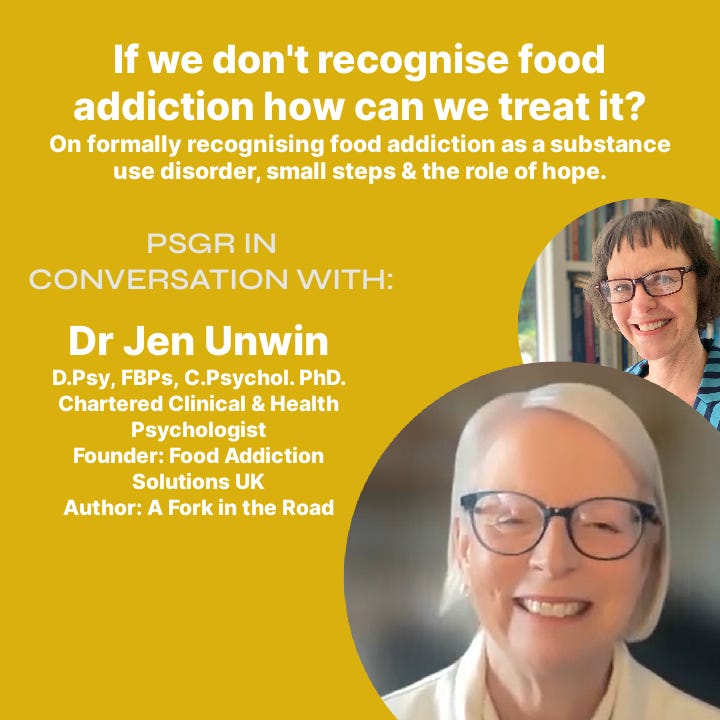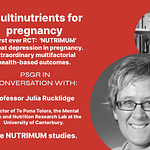Dr Jen Unwin, Chartered Clinical & Health Psychologist - 30 years UK NHS. D.Psy, FBPs, C.Psychol. PhD.
Co-founder: Food Addiction Solutions (FAS) UK.
Original 2-part interview on YouTube (with scientific papers on-screen):
[1] Game-changing UK doctors' clinic. 10 years of reversing diabetes!
[2] If we don't recognise food addiction, how can we treat it?
Food Addiction Solutions (FAS) UK: Our vision is a society where the addictive nature of certain foods is recognised, and focused treatment programmes are being funded, to improve health outcomes for sufferers.
On why recognising food addiction is important for science & policy:
We’re always saying we need to do something about this diabetes and this obesity, but if we’re not recognising the fact that certain foods are addictive in nature, I don’t think we’re going to ever succeed at that.
Unless a condition is recognised it’s really hard to get money for research. If people are applying for research money - that has to be a recognised condition. There aren’t going to be treatments developed and evaluated.
At the moment somebody with a food addiction really falls nowhere really, in terms of treatments offered. They may get referred to an eating disorder service, but eating disorder services on the whole don’t recognise this condition and wouldn’t know what to do with it. In fact, a traditional eating disorders model is an ‘all foods fit’ model. Recovery looks like people can eat a bit of everything and then moderate that. No banned foods.
Every single food addict is going to fail with that model. That may explain some of the poorer outcomes that we see in eating disorder services. Eating disorder services are not going to help you.
You might get referred to psychiatry but they’re not going to understand it either, or know what to do with you.
You might get referred to an addiction service, but again they tend to work with substance addiction like drugs and alcohol, so they’re not quite going to know what to do with you. If they did a little bit of lateral thinking, they would know what to do with you, … because the addiction treatment should be the same - that you avoid the addictive part of the addictive substance.
There are a lot of people in the UK and the world who are suffering from this problem, they don’t have a name for it, they feel ashamed of their behaviour, and they’re harming their health.
Because this condition is hidden, because nobodies got a name for it, then people are left without help.
The International Food Addiction Consensus Conference, IFACC 2024, was held in London on 17th May 2024 to celebrate the Consensus reached between 37 out of 40 international researchers, academics and clinicians, with 250 delegates and 350 Live-Steam watchers around the world. (A minimum donation of GBP25 is required to access the speaker presentations and copies of their slides.)
On recognising that the body and brain responds differently to addictive ultraprocessed foods than to nourishing, wholefoods:
This is often a criticism of food addiction. People say ‘how can food be addictive? We need to live! It’s not like you need alcohol or drugs or cigarettes. You can give those up, they’re not necessary for life’ … of course that’s true. We need to eat to live. But we don’t need to eat our ‘drug foods’. They tend to be ultraprocessed foods that are high in sugars, refined grains, fats and salts. … We all know the kinds of things that are a bit addictive.
If you look at it through an ancestral lens, we didn’t evolve to eat those foods, and that’s part of the problem. Those foods are so stimulating to the reward centre, that we literally can’t control our behaviour.
The non-verbal, physical response of the addicted brain:
You’re responding to that stimulus to reach for more, which is happening at a non-verbal part of the brain - it’s this automatic reaching. … It’s almost like your disembodied hand is reaching into the biscuit barrel at the same time you are saying ‘I don’t want to be doing this’, you’re watching yourself do it.
It isn’t necessarily sugar. ‘I know it sounds ridiculous, but I just can’t stop eating bread.’ We get that quite a lot.
On why Unwin and colleagues conducted this research on food addiction treatment:
Unwin J, Delon C, Giæver H, Kennedy C, Painschab M, Sandin F, Poulsen CS and Wiss DA (2022) Low carbohydrate and psychoeducational programs show promise for the treatment of ultra-processed food addiction. Front. Psychiatry 13:1005523. doi: 10.3389/fpsyt.2022.1005523
If you look in the literature there’s hardly anything on treatment and intervention. There’s really nothing.
We need to do this as a proper audit. Have a look at the outcomes across the board and see if it is actually effective - and importantly - see if it effective in the long term.
We know this is a chronic condition, we know it’s relapsing. Any treatment has to show that it’s effective long term.
On who gets addicted to ultraprocessed food:
People coming forward for treatment tend to be middle-age female. … I don’t think that that necessarily means that there aren’t a lot of male food addicts out there. I think they’re not coming forward for treatment. Men are much more likely to come forward for alcohol treatment than women. That doesn’t mean that there aren’t women struggling with an alcohol problem. I think it’s partially a cultural thing about who comes forward for treatment.
On the role of hope to establish an idea of a preferred future and plan change:
Hope is a very powerful predictor of how people cope with life and challenges, whether they’re medical - or whatever they are really. My doctorate was based on looking at people who were having a lower limb amputation. What was it that predicted who did well, and who didn’t do so well. Who adjusted emotionally and physically to that challenge. … Was it age? Was it gender? Were there other factors that would predict who coped best with that challenge?
The best predictor by a country mile was hope and hopefulness. … The idea is that hope is to do with having a sense of a preferred future - not just that - having a sense that you’ve got the ability to take the steps to get to that preferred future, and thirdly, to know what the steps are.
All of the positive psychology and behaviour change [literature] shows that tiny, small, incremental goals are much more effective than setting yourself some massive change. You’re much more successful if you make these small changes that then become habits and then become embedded.
Dr Unwin also discusses the work of the practitioner to support in the reinforcement of small incremental changes and navigate ups and downs.
On fault, blame and responsibility:
It’s not your fault you’re an addict but once you’ve got the information and the support it’s your responsibility to do something about it.
On public health authorities failing to recognise nutrition and brain health:
Unfortunately, modern dietary advice isn’t the best brain-health advice.
Like this podcast? Any of our podcasts on Substack are also on Spotify. Everyone can search for @PSGRNZ on Spotify for easy, informative listening on their work commute!














